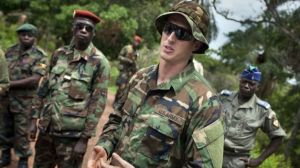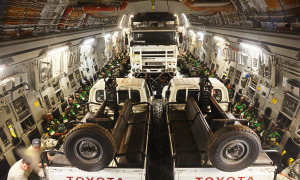
In the past, the US mainly tried to control economies of Africa through its neo-imperial institutions such the World Bank and IMF; however, this strategy could not work as effectively as it was expected to counter Chinese ingress in Africa. Failure to counter in economic field has compelled the US and its allies, such as France, to boost up militarization of the continent in the name of “humanitarian” aid. As such, recent years have seen a manifold increased in militarization of Africa which has gone almost unnoticed by the ‘politically conscious’ public of the US and its allies.
According to a October 2013 report of New York Times, thousands of the US soldiers, who have previously operated in Iraq or Afghanistan, are now gearing up for missions in Africa as part of a new Pentagon strategy to train and advise indigenous forces in order to enable them to tackle emerging terrorist threats and other security risks. In addition to it, the US army is also supposed to engage in more than 100 ground operations of different sorts in the year 2014 alone. Besides it, the US has also sent its rapid response force to Djibouti to respond in times of emergency and control the situation. The decision to send this force was taken in response to the attack on the US Mission in Benghazi, Libya, last year, which killed four Americans.
According to the official ‘propaganda’, the US army is being sent to restore ‘peace’. This is quite evident from the kind of stories being reported in the Western media. For example, in another story of NYT, it was stated that the American commando raids against terrorist operatives in Libya and Somalia underscored the “spreading extremist threat in Africa, and a renewed urgency to choke off insurgent cells before they can grow…” Stories like this are being systematically used by the US government, by portraying a specific image of Africa, to build public opinion favourable to the US’ increasing military engagement in the continent. Reporting of this incident was, as should have been expected, followed by the US President’s ‘determination’, expressed in a press conference held three days after the raid, to go after militants operating in Africa—-hence a justification for increased military presence.
On the other hand, it is well known that the US very easily declares any organization, which puts up an anti-US struggle, as a terrorist organization. Similar sort of developments have taken place in Africa too, where many of the anti-US groups have been declared as terrorists, and as enemies of peace and development. While the US continues to propagate the “terrorist mantra” to justify its position, the underlying causes of growing ‘instability’ in East and Central Africa remain underreported or not reported at all in the Western media. The real cause of infighting in this part of Africa is, as such, not terrorism; it is the US’ and its allies’ ambition to grab a vast repository of oil, natural gas and other strategic minerals.
To consolidate its own presence, increase regional states’ dependence upon the US led coalition forces, and to minimize room for strategic maneuvering for other states, the US Defence Department recently announced the formation of an East African Response Force. This new unit is part of the United States Africa Command (AFRICOM) which has been strengthened under the administration of President Barack Obama. In addition to increasing military presence through creation of such forces, the US has also become pro-actively engaged in launching strikes in specifically targeted zones. For example, a recent drone attack (January 2014) in southern Somalia reflects the growing aggression of the US in Africa. The government of Djibouti, a former French colony where the US has a military base with over 4,000 soldiers at Camp Lemonnier, released a statement saying that such strikes are “vital” in the so-called “war on terrorism—”, an umbrella term notoriously being used by the US since 9/11 to legitimize its potentially criminal activities aimed at gravitating its influence across continents.

In this behalf, and now with additional force available, the US has been working on transforming the very character of AFRICOM since last few years. Far from being a supporting instrument for the ‘national’ governments of Africa, it has now assumed the role of aleader and initiator of military activity. In 2013 alone, according to AFRICOM commander General David Rodriguez, the US military carried out a total of 546 “activities” on the continent—a catch-all term covering almost everything the military does in Africa. This represents a 217% increase in operations, programs, and exercises since the command was established in 2008. In a testimony before the Senate Armed Services Committee earlier in March 2014, Rodriguez again highlighted that the 10 exercises, 55 operations, and 481 security cooperation activities in a year have really transformed AFRICOM into a pro-actively engaged “geographic command”, capable of assuming even more responsibilities in future, thereby implying a virtual takeover of Africa’s militaries by the US military and maintaining an almost childlike dependence of the former on the latter. Therefore, the Western rhetoric of “humanitarian” missions in Africa is far from the truth, and contrary to ground realities of Africa. In reality, many of the African states, who are supposedly independent and sovereign, are teeming with Western military personnel who, though claim to be friends and helper, are actually a manifestation of the Western neo-imperialism.
Apart from increasing its own military presence, the US has also been directly and indirectly supporting France in increasing the latter’s ingress in Africa. The US has to look for alternatives because it would help her evade public criticism and Congressional approval for increasing military engagement in Africa. However it does not mean that the US congress is unaware of these developments. The fact of the US’ support for France was highlighted by Reuters when it reported a “fast-tracked” sale of 12 Reaper drones by the US to France last year, the first two of which have already been operating in Niger since January 2014 alongside the US drones already there. In return for the US support, France is supposed to take on the large, sustained military operations in Africa that are off-limits to the US, while the US military is left to lurk in Africa’s shadows training and manipulating African armies and staging occasional quick-hit raids—the magnitude of which has grown exceptionally high in recent years—on the alleged terrorist outfits.
It is quite evident from our analysis that the reason(s) for the current wave of violence in Africa is not merely infighting among different groups or activities of terrorist groups as is being projected to justify and legitimize the US’ military engagement. It has to be highlighted that the military operations of the US and France are an even bigger cause of the fast spreading violence, given the fact that their operations provoke reaction among the affected masses who are then forced by circumstances to engage in armed resistance against the imperial forces. That the atrocities of the Western armies remain underreported in the Western media is understandable given the nature of corporate relations between the media and the Western governments, since both benefit from such artificially created ‘unstable’ conditions requiring ‘humanitarian’ assistance.
Salman Rafi Sheikh, research-analyst of International Relations and Pakistan’s foreign and domestic affairs, exclusively for the online magazine “New Eastern Outlook”.
